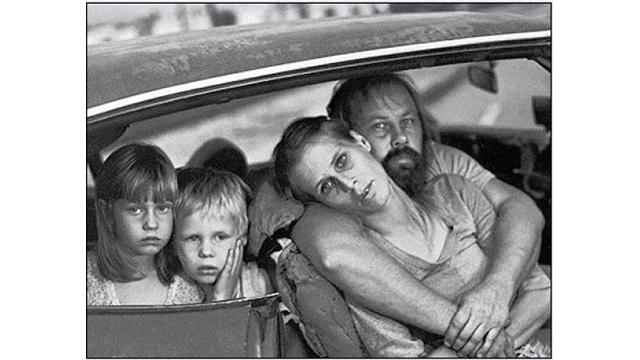
Yes, you've caused people to suffer. You've taken from the poor and the middle class for thirty years, from Reagan to Obama, using a variety of strategies to redistribute wealth to the top. Yet you insist that the middle class should accept cuts in Social Security to pay off the deficit.
Here is the effect of your funds transfer:
In 1983 the poorest 47 percent of America owned $750 billion dollars, $15,000 per family, 2.5 percent of the nation's wealth.
In 2009 the poorest 47 percent of America owned ZERO PERCENT of the nation's wealth (their debt exceeds their assets).
Your thirty-year redistribution of wealth has most severely impacted four particularly vulnerable parts of American society:
1.Children
One out of every five American children now lives in poverty. A country that considers itself the greatest in the world is last among developed nations in providing the everyday needs of its youngest and most dependent citizens.
The poverty level for U.S. children is up 50 percent since 1973. It's an epidemic in the black community, where, shockingly, close to half the children under the age of six live in an impoverished household. And worse yet, the percentage of such families receiving assistance has dropped by two-thirds since 1995.
2.The Elderly
While official poverty rates for seniors have declined since 1970, averages are misleading in the face of inequality. The wealth gap was already extreme for the 60 age group in 1995 and has grown for ALL age groups since that time, with an upsurge since 2005 that, according to the Census Bureau's Supplemental Poverty Measure, has left one out of six seniors in poverty.
The majority of elderly Americans may not be at the official poverty level, but they're still very poor. Sixty percent of women over 65 (and 41 percent of men) have incomes insufficient to cover essential everyday expenses. And as the rest of American adults grow older, half of them are not saving anything for retirement.
It would be much worse without Social Security. The median income for seniors is less than $20,000 a year, and even though Social Security provides only an average benefit of $15,000, it accounts for 55 percent of annual income for the elderly. The Center on Budget and Policy Priorities estimates that almost half of American seniors would drop below the poverty line without their Social Security benefits.
3.The Homeless
A story in The Nation describes a day in the life of a 56-year-old San Francisco woman named Marcia. She arrived at a shelter at 7 AM, but was too late to claim a bed for that night, even though nighttime was 12 hours away. So she slept on the train during the day, knowing that she might be standing in the cold after midnight waiting for a bus. Her only other option was a local drop-in center, where she could spend the night sitting in a chair. If she lay down she'd be asked to leave.
Before the 1980s homelessness existed largely as an occasional occurrence of bad luck for a family, perhaps a mother who needed a few days to find a job. Then President Reagan redirected blame for indigence to the poor themselves, and market-driven policies took over. Since 1980 the number of homeless people has doubled or tripled every decade. Up to 3.5 million people—one out of every hundred Americans—experience homelessness at some time during an average year. But a survey of the fifty largest U.S. cities determined that almost none of them has sufficient shelter beds for homeless residents.
The federal housing budget has dropped from $86 billion in 1976 to $45 billion in 2013. This has occurred despite a study that revealed the cost of supportive housing as less than half the cost of prison accommodations. In Los Angeles, a UCLA study found that more was spent on skid row policing than on homeless shelters.
4.Students
Stories abound of young graduates mired in debt, unable to earn enough from low-wage jobs to stay ahead, and often regretting their choice to go to college. Nick Keith, for example. After graduating from the California Culinary Academy he found a job paying $10 per hour. Unable to keep up with loans growing at a 19 percent rate, he stopped paying, and now owes $142,000. As he struggles to survive on a $1,200 per month disability check, with a rock-bottom credit score and college credits that won't transfer, he collects cans for extra money, and spends the nights in an old van at a truck stop.
Tuition at public colleges has nearly doubled in just ten years. The average student loan debt has reached $26,682. Yet the charade of affordability continues. One Ohio college advises students to focus on the "return on investment" from their four years at school.
Over half of degree holders are unemployed or working a low-wage job. Even young men and women with advanced degrees have been victimized by false promises, as over 300,000 masters and PhD students now collect food stamps. Colleges have responded by hiring more administrators—their numbers are up 60 percent since 1993.
The state of education in America? Just 20 rich Americans made more money in one year than the entire U.S. education budget. In the states themselves, where the primary responsibility for education lies, education cuts amounted to $12.7 billion in 2011, about the same amount left unpaid by corporations in 2011 state taxes.
Wealthy America, you've taken so much that one out of five American families has negative wealth—no assets, and household debt of $27,000. Yet you still want them to give up their Social Security benefits. It's not shame you should feel, but loathing.
3 WAYS TO SHOW YOUR SUPPORT
- Log in to post comments















